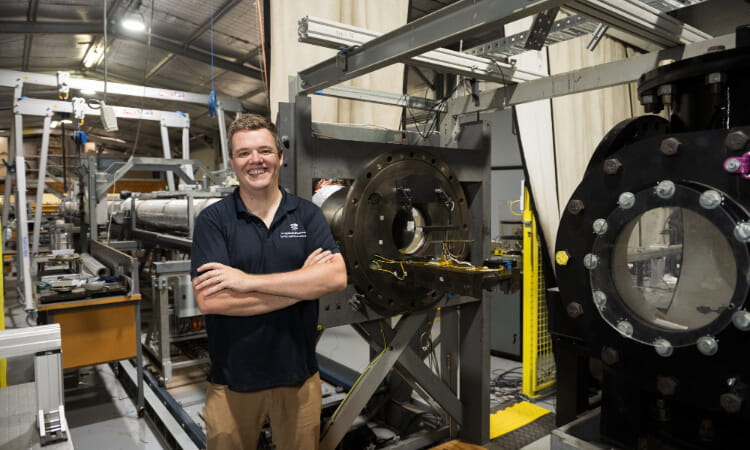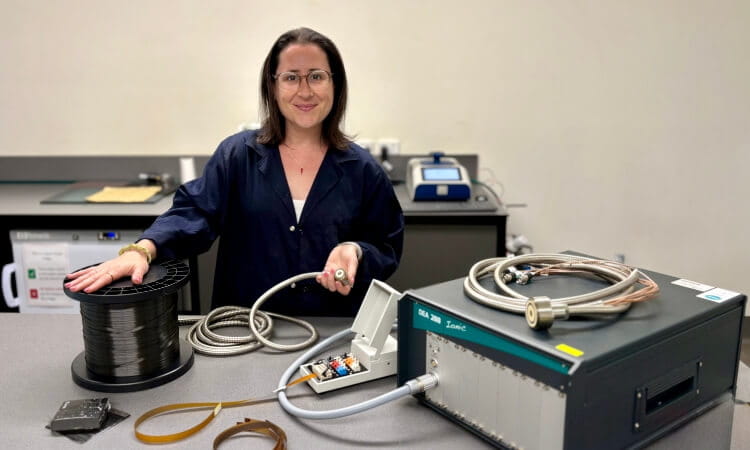Spotlighting our Research: June 2025

If you’re curious about what’s new in research at the University of Southern Queensland (UniSQ), you’re in the right place.
Since our last edition of Spotlighting our Research in March, we’ve secured new international rankings and grants, and continued to deliver world-class research.
Let’s dive into our latest Research updates and developments!
Research News
Launch of the Phenospex PlantEye scanner
Unveiled in February at a launch attended by government representatives and industry stakeholders, we are now home to the Phenospex PlantEye F600 H-Portal scanner. The PlantEye scanner is a fully automated system that scans thousands of plants multiple times daily to create 3D models with multispectral information, providing advanced plant growth and productivity insights. We’ve become the first university in Australia to acquire the H-Portal model, and its use supports our researchers to be at the cutting edge of their field to deliver agricultural and crop health research outcomes applicable to agricultural settings both in Australia and abroad.
International rankings
The 2025 QS World University Rankings by Subject were released in March, with the following positive results:
- A total of eight subject rankings, including four new entries.
- New entries include Economics and Econometrics (ranked 551-700); Computer Science and Information Systems (ranked 751-850); Medicine (ranked 701-850) [we are ranked in medicine as medicine-related subjects are taught]; and Material Science (ranked 351-400).
- Mechanical, Aeronautical and Manufacturing Engineering improved its ranking to 401-450.
- Agriculture and Forestry and Environmental Science have both maintained their positions ranked in the 301-350 and 351-400 bands respectively.
- Education is no longer ranked.
Research grant success
Department of Education – Australia's Economic Accelerator (AEA) Ignite Program:
- Dr Peter Harris and Professor Bernadette McCabe from the Centre for Agricultural Engineering received funding ($198,679) through the program for their project, which will evaluate technology for producing duckweed as a source of biomass for biofuel production.
- Associate Professor Lei Ge and Professor Hao Wang from the School of Engineering and Centre for Future Materials are participating on a University of Sydney AEA Ignite Program project that will develop an advanced gas sensor to address critical safety needs for industries transitioning to hydrogen as a clean energy source.
Ignite grants support early-stage research commercialisation for researchers at Australian universities to complete basic research, laboratory testing, and establish proof-of-concept in an industry-relevant environment.
Australian Coal Industry Research Program (ACARP):
- Associate Professor Ali Mirzaghorbanali – leading a team including Dr Saya Ramakrishnan, Dr Hadi Nourizadeh, Professor Thiru Aravinthan and Professor Kevin McDougall – has received $148,000 from ACARP to develop a geopolymer grout mixture tailored for coal mining applications with outstanding pumpability, minimal shrinkage, and strength properties.
Falling Walls Lab Brisbane
This year, we are hosting the Falling Walls Lab (FWL) event at UniSQ Brisbane. The FWL is a world-class pitch competition that brings together a diverse and interdisciplinary pool of students and early-career professionals to pitch their breakthrough solutions to the world’s most pressing problems. The FWL is a unique opportunity for HDR students and early-career researchers to elevate their ideas, grow professionally, and join a global community of changemakers. Applications to pitch at FWL are open until Monday 30 June.
Research Spotlight: Health at UniSQ
Our health research is entering a dynamic new phase, gaining recognition through groundbreaking projects supported by state and federal governments, as well as industry partners. With $6.5 billion committed through the third 10-year Medical Research Future Fund (MRFF) investment plan (2025–2034), we are well-positioned to expand its impact across the full spectrum of health and medical research – from discovery to translation and commercialisation.
In recent news, Associate Professor Melissa Taylor’s leadership in the West Moreton Care Collaborative has been recognised by Dementia Australia and will be showcased as a successful case study at an upcoming Community of Practice for Primary Health Networks (PHNs). In partnership with Darling Downs and West Moreton PHN and West Moreton Health, Associate Professor Taylor has led the West Moreton Care Collaborative, uniting government, non-government, and community stakeholders to improve social care systems and outcomes for older people in the West Moreton region.
A key achievement is the co-creation of the West Moreton Dementia Network, which has driven the development of dementia-friendly communities across Somerset, Scenic Rim, Lockyer, and Ipswich and embedding change in communities. Praised for its community-first approach, the initiative places people living with dementia and their supporters at its core and has fostered genuine partnerships between clinicians, researchers, and the community. Dementia Australia is now highlighting this work to all 31 PHNs across Australia.
A number of other exciting health research projects, commencing in 2025, include:
- Professor Khorshed Alam and Dr Priya Martin are working in collaboration with the University of Queensland Rural Clinical School and Goondir Health Services to develop and deliver a national, Indigenous-led digital health service model through a $500,000 MRFF-funded grant. Their work will develop a culturally responsive, sustainable and cost-effective model that enables Indigenous Australians with chronic diseases to utilise digital health advances.
- Professor Benjamin Tan, Dr Sita Sharma and Ashlee Stirling are conducting a new project to co-design and test a nurse-led supportive care program tailored to the needs of breast cancer survivors in Queensland. The research team received $20,000 from the Cancer Nurses Society of Australia to support their project, which they are conducting in partnership with three primary care medical centres in Queensland.
- Dr Ben Hoffman, Dr Patricio Pincheira and Professor Stephen Bird secured $248,784 from the CSIRO Industry PhD Program to support a PhD stipend and project to develop a low-cost, objective and automated system using artificial intelligence for enhancing movement of pre-elite student athletes. This project utilises markerless motion capture technologies and produces exciting new athlete technologies in the lead up to the 2032 Brisbane Olympic Games.
- Associate Professor Annette Bromdal, Dr Daniel Brown, Emerson Zerafa-Payne, and Professor Amy Mullens received $99,984 funded through the Queensland Mental Health Commission Suicide Prevention Research Scheme in late 2024, for their multi-study investigation of gender-affirming healthcare access for trans and gender diverse communities in Queensland. The team are exploring the barriers, enablers, and experiences of gender affirming healthcare to prevent suicide, build resilience and inform transformational change in Queensland.
- Professor Andrea Lamont-Mills, Dr Carol du Plessis and Mr Steven Christensen also received funding from the Queensland Mental Health Commission Suicide Prevention Research Scheme ($89,486) to progress research on how to transform suicide risk into safety through online discussion forum interactions. The team are examining online discussion forums as a unique, scalable and accessible modality for suicide support.
- Dr Daniel Brown, Associate Professor Annette Bromdal, Professor Amy Mullens, Dr Kirstie Daken and Emerson Zerafa-Payne were awarded $22,707 by the Australian Association of Gerontology to examine the expectations and experiences of aged care services for LGBTQISB+ older people with intersectional identities. The project will identify the specific needs of LGBTQISB+ elders with intersectional identities (e.g., First Nations, culturally and linguistically diverse, living with disabilities) and inform the development of equitable service provision for this population.
Find out more about UniSQ’s Research.


